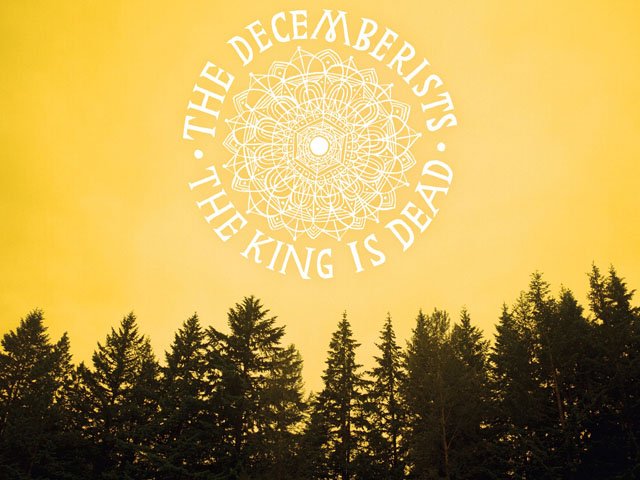
Album review: The Decemberists – The King is Dead
 The term progressive can have rather dangerous effects on music. For starters it makes the typical music fan cringe with ideas of long-winded guitar solos and lyrics about gnomes fighting dragons. Second, it can cause musicians to try to make albums that actually match those ideas. When coupled with other words like “19th century sea-faring folk ballads” it has to be questioned whether anyone would even bother listening. And yet here we are witnessing the sixth studio album from the Decemberists more than a decade into their career.
The term progressive can have rather dangerous effects on music. For starters it makes the typical music fan cringe with ideas of long-winded guitar solos and lyrics about gnomes fighting dragons. Second, it can cause musicians to try to make albums that actually match those ideas. When coupled with other words like “19th century sea-faring folk ballads” it has to be questioned whether anyone would even bother listening. And yet here we are witnessing the sixth studio album from the Decemberists more than a decade into their career.
After having built a sizable following with what seems like a rather niche take on indie rock, perhaps it is those potential trappings that forced Colin Meloy and company’s hand towards taking a more stripped-down and straightforward approach on The King is Dead. Clearly it isn’t the relationship with Capitol Records that has influenced this change. Their 2006 major label debut, The Crane Wife, and its follow-up, The Hazards of Love, both indulged heavily in the excesses of the rather unique progressive folk style they had staked as their own. More likely the time had simply come for a change before turning into self-parody.
While The Crane Wife was a superb album that represented the culmination of both Meloy’s epic story telling and the band’s off-kilter pop music, The Hazards of Love took a turn for the worse. Although there were many excellent moments, its presentation as a single song cycle with 17 tracks became overwhelming over the course of an hour. This time around, rather than simply scaling back the concepts, The Decemberists have redirected their influences to the far more accessible realm of Americana.
From the opening chords the difference is striking. Hearing a band perhaps best known for producing a nearly 9 minute tale of revenge on the high seas sound like they are trying to re-create the simple country rock of Tom Petty’s Wildflowers will do that. But the reality is that the mixture of folk and alt-country on The King Is Dead plays well to their strength as musicians who rely on the sounds of instruments like the accordion, melodica, bouzouki, etc. And the addition of guests in the form of Peter Buck (yes, the R.E.M. influences are obvious) and Gillian Welch (adding vocals to the excellent “Down by the Water”) cement the identity of this album.
 That’s not to say that it is a complete success. While the opening Petty-esque “Don’t Carry It All” sweeps effortlessly into the foot-stomping “Calamity Song”, slower tracks such as “Rise To Me” and “Dear Avery” do have a certain filler quality to them. But after repeated listens they have already begun to grow on me as solid counterparts to the more upbeat swings that dominate the music. For now it feels that the biggest downfall may be the awkward country vibe of “All Arise!”, which sounds like a rough take of a weak song at best.
That’s not to say that it is a complete success. While the opening Petty-esque “Don’t Carry It All” sweeps effortlessly into the foot-stomping “Calamity Song”, slower tracks such as “Rise To Me” and “Dear Avery” do have a certain filler quality to them. But after repeated listens they have already begun to grow on me as solid counterparts to the more upbeat swings that dominate the music. For now it feels that the biggest downfall may be the awkward country vibe of “All Arise!”, which sounds like a rough take of a weak song at best.
Colin continues to deliver his nasal “is he British or not?” vocals with a confident tone that flows well with the music without overpowering it. But there are fewer instances of his brilliant wit working its way through archaic prose. “Rox in the Box” may be the finest example in this collection with the declaration, “And you won’t make a dime / On this gray granite mountain mine / Of dirt you’re made and to dirt you will return.” It may not entirely be the simplicity of tracks, but rather the lack of a definitive storyline that makes the pictures he attempts to construct harder to envision and follow. However this may have less to do with quality and more to do with listener expectations.
Although The King Is Dead is clearly a departure that may rub longtime fans the wrong way, it is an excellent example of a band that continues to mature 10 years later. Accessibility – and even commercial viability – is not necessarily an evil concession for musicians; in this case it should make plenty of new fans while pleasing old ones willing to accept change. After several spins this album is not only holding up well but, in many places, getting better.